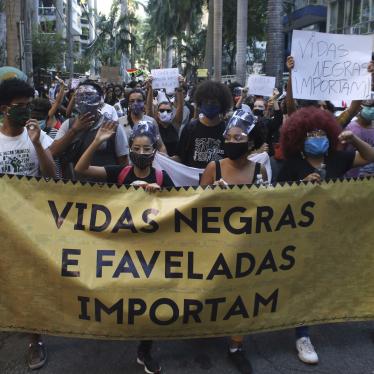(São Paulo) – Brazil’s Congress should ensure that any measure aimed at addressing defamation and the spread of false information upholds people’s fundamental rights to freedom of expression, association, and privacy, Human Rights Watch said today.
The current draft of a so-called “fake news” bill in the Senate contains vague and overbroad provisions that are open to abuse. It would unnecessarily restrict and penalize legally protected speech and freedom of association, including with prison terms, and undermine the privacy of communications. The Senate should reject it.
“Congress appears to be rushing to approve a bill that may achieve little except stifle free speech online and require internet companies to collect enormous amounts of data about all users,” said Maria Laura Canineu, Brazil director at Human Rights Watch.
Bill 2630/2020, introduced on May 13, 2020 in the senate, is scheduled for a vote on June 25. The text has changed numerous times in that short period and has not been widely debated publicly in the midst of the Covid-19 pandemic.
The current draft includes provisions that threaten freedom of expression and association and the right to privacy. For instance:
- The bill makes it a crime, punishable with one to five years in prison, to create or share content that allegedly poses a serious risk to “social peace or to the economic order,” without defining those terms. It also makes it a crime to be a member of an online group knowing that its primary activity is focused on sharing defamatory messages, even if the member has not created or shared those messages.
- The bill requires internet communication platforms to collect users’ ID and cell phone numbers to open messaging and email accounts. People who do not have a cell phone would not be able to open those accounts. Platforms would be required to suspend accounts when a phone number is cancelled, for instance for non-payment. Those provisions would create giant databases with the identity of all users and make it harder for poor people to use the internet.
- The bill orders internet companies to track the chain of forwarded communications of all Brazilians for at least four months. This would create a massive database that can be easily misused for political purposes, to track journalists’ sources, or to criminally persecute people for sharing messages that authorities consider to be a risk to “social peace or to the economic order.”
- The bill prohibits using “manipulated” content for the purpose of “ridiculing” political candidates. In cases where it does occur, a judge would determine the identity of the candidate “who benefited” from the ridicule and order that candidate to pay a fine of up to 10 million reais (US$1.9 million). That broad provision would effectively ban satire and irony during elections, and thus violate free speech guarantees.
The latest draft was released by Senator Angelo Coronel on June 19. It can change before it is formally presented to the senate for a vote on June 25.
While curbing the dissemination of false information that can cause direct and serious harm to others may be a legitimate goal, it is essential for laws regulating speech to strictly respect fundamental human rights law. International law provides that any regulation of freedom of expression must be necessary for a legitimate purpose, such as the protection of national security, public health, or the rights of others, and strictly proportionate to achieve that end.
Even when a law has a good-faith, legitimate purpose, states are obligated to specifically identify the nature of the threat being addressed and how the measure proposed is both a necessary and proportionate means of addressing it. The provisions in the bill do not satisfy these criteria. In particular, imprisonment is never an appropriate penalty for defamation, and the overbroad provisions violate free speech protections under human rights law.
In a March 2017 joint statement, special rapporteurs from the United Nations, the Organization of American States (OAS), the Organization for Security and Co-operation in Europe (OSCE), and the African Commission on Human and Peoples’ Rights (ACHPR) said that states should avoid “general prohibitions on the dissemination of information based on vague and ambiguous ideas, including ‘false news,’” and abolish criminal defamation laws, among other recommendations.
In 2013, the then-UN special rapporteur on the promotion and protection of the right to freedom of opinion and expression stated that “privacy and freedom of expression are interlinked and mutually dependent” and warned that without adequate legal standards to ensure the privacy, security, and anonymity of communications, “journalists, human rights defenders, and whistleblowers, for example, cannot be assured that their communications will not be subject to States’ scrutiny.”
In a 2015 report on encryption and anonymity in digital communication, the current UN special rapporteur said that states should refrain from making identification of users a condition for access to online services. “Because anonymity facilitates opinion and expression in significant ways online, States should protect it and generally not restrict the technologies that provide it,” the special rapporteur said.
“If approved, the ‘fake news’ bill scheduled for a vote on June 25 would violate free speech and encroach on the privacy of all Brazilians who communicate online,” Canineu said. “The president of the senate should cancel the vote and allow for significantly more time for a broad discussion, including civil society, of a new bill that doesn’t sacrifice basic rights.”







